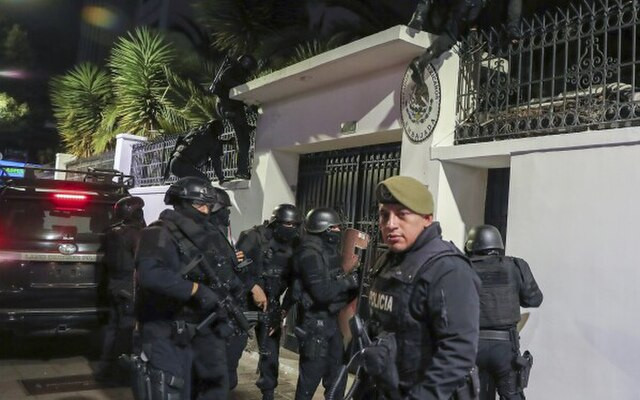Latin American governments have rallied around Mexico after Ecuadorian police stormed the Mexican Embassy in Quito to arrest former Ecuadorian Vice President Jorge Glas. The controversial politician, who had been granted asylum by Mexican authorities, was seized in the late Friday night raid, causing outrage in Mexico City and prompting the suspension of diplomatic relations with Quito.
Glas, 54, had been residing in the embassy since December, seeking political asylum from a preventive arrest warrant related to another corruption case. Mexico had granted his asylum request earlier on Friday, just hours before the unusual diplomatic incursion and arrest took place.
Mexican President Andres Manuel Lopez Obrador strongly condemned the raid, labeling it an "authoritarian" act and a breach of international law and Mexico's sovereignty. Under international law, embassies are considered the sovereign territory of the country they represent, making Ecuador's actions a severe violation of diplomatic norms.
The government of Ecuador's President Daniel Noboa defended the move, arguing that Mexico's asylum protections for Glas were illegal due to his existing corruption charges. Glas, who served as vice president under the leftist government of Rafael Correa between 2013 and 2017, has complained of political persecution, a claim that Ecuador's government denies.
Sonia Vera, Glas' international lawyer, stated that his legal team is seeking help from the Inter-American Commission on Human Rights, the Inter-American Court of Human Rights, the United Nations Security Council, and the General Assembly. Video footage circulating on social media showed Glas being taken by police convoy to the airport in Quito, flanked by heavily armed soldiers, before boarding a plane en route to a jail in Guayaquil, Ecuador's largest city.
Governments across the political spectrum in Latin America, including Brazil, Colombia, Argentina, and Uruguay, have sharply criticized the storming of the embassy. Photos on social media, including one posted by Cuba's foreign minister, appeared to show the embassy's wall being scaled by armed police or soldiers, although Reuters could not immediately confirm the authenticity of the images.
Brazil's government condemned Ecuador's actions as a "clear violation" of international norms prohibiting such raids on foreign embassies, stressing their solidarity with Mexico. The Brazilian foreign ministry emphasized that Ecuador's move "must be subject to strong repudiation, whatever the justification for its implementation."
In an interview with local broadcaster Milenio, Mexico's top diplomat, Alicia Barcena, expressed shock at Ecuador's incursion, adding that some embassy personnel had been injured in the raid. She stated that Glas had been granted asylum after an exhaustive analysis of the circumstances surrounding the accusations he faces.
The Mexican foreign ministry has announced its intention to file a complaint with the United Nations' International Court of Justice for "grave violations of international law." The Washington-based Organization of American States issued a call for dialogue to resolve the escalating dispute, emphasizing the need for "strict compliance with international treaties, including those that guarantee the right to asylum."
Colombian President Gustavo Petro argued in a post on X (formerly Twitter) that Latin America "must keep alive the precepts of international law in the midst of the barbarism that is advancing in the world." Petro's government noted that it will seek human rights legal protections for the now-detained Glas.
Ecuadorian authorities had unsuccessfully sought permission from Mexico to enter the embassy and arrest Glas, who was sentenced to six years in prison in 2017 for taking bribes from Brazilian construction firm Odebrecht in exchange for government contracts. In 2020, he was convicted again of using money from contractors to fund campaigns for Correa's political movement, receiving an eight-year sentence.
The unprecedented breach of diplomatic protocol has sent shockwaves through the international community, with regional leaders and diplomats expressing their solidarity with Mexico and condemning Ecuador's actions. As the situation continues to unfold, the long-term implications for diplomatic relations between the two countries and the broader Latin American region remain uncertain.
Glas' attorney, Sonia Vera, expressed fears for her client's safety while in custody, citing the track record of Ecuador's detention facilities, where hundreds of people have died during violent riots in recent years. "In Ecuador, going to jail is practically a death sentence," Vera said, holding President Daniel Noboa Azín responsible for Glas' life as an "international political and legal person."
The Mexican Embassy in Quito remains under heavy police guard following the raid, which marks the boiling point of recent tensions between Mexico and Ecuador. As the international community closely monitors the situation, the breach of diplomatic norms and the potential consequences for regional stability have become a cause for concern and condemnation.






